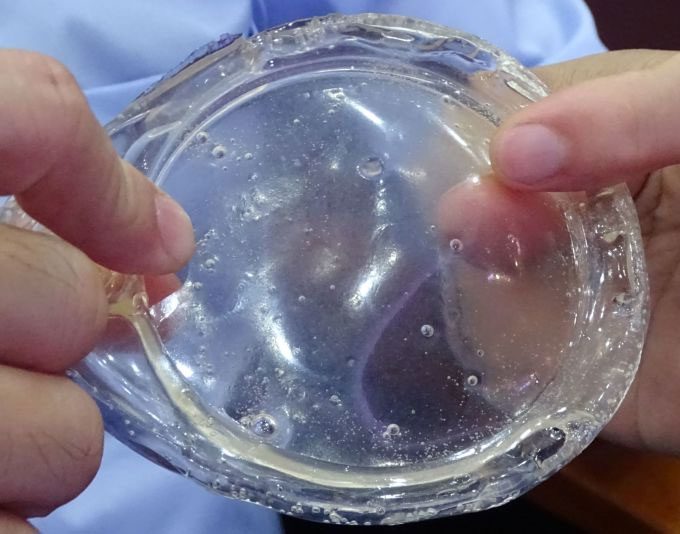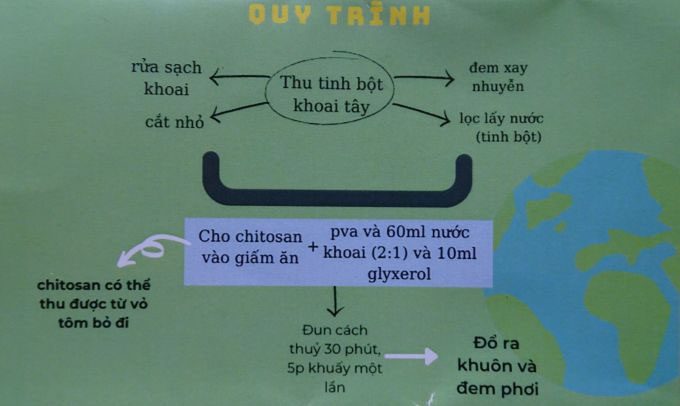Leveraging spoiled potatoes, a group of students from Bui Thi Xuan High School in District 1 has created a biodegradable plastic that is flexible and resistant to breakage, making it suitable for household items.
The product was researched over six months by Pham Thanh Hanh Thu, Tong Dang Khanh Vinh (12th grade), and Vo Ngoc Thuy Dung (10th grade), aiming to develop a type of plastic that is durable yet decomposes easily when buried. The initiative seeks to reduce the environmental pollution caused by single-use plastics and plastic bags.
Hanh Thu shared that during the social distancing period in Ho Chi Minh City last year, many vegetables, including potatoes reserved for food, sprouted and had to be discarded. Noticing that potatoes have good adhesive properties, Thu and her team sought ways to utilize them to create biodegradable plastic.
Upon starting their research, the team discovered that potato starch was not very durable, so they mixed in chitosan extracted from shrimp shells and Polyvinyl Alcohol (PVA) to enhance the product’s durability. “Spoiled potatoes and shrimp and crab shells are waste materials that are readily available, making them suitable for producing biodegradable plastic, promoting a green lifestyle for the community,” Thu stated.

Biodegradable plastic produced by the group. (Photo: Ha An)
To create the biodegradable plastic, the team collected sprouted potatoes, washed them, and blended them into a fine paste using a blender. They then filtered the mixture through cloth to obtain a solution containing starch. This starch was mixed with PVA, glycerol, chitosan, and vinegar, then heated in a water bath for 30 minutes before being poured into molds and dried for 2-3 days to yield the final biodegradable plastic product. The result exhibits good elasticity, is difficult to stretch, and resists breaking.
From this outcome, the team shaped the plastic into various household items such as coasters, phone cases, and storage containers for school supplies. The products are durable, resistant to mold, and do not decompose during several months of use.
Team member Khanh Vinh mentioned that the biodegradable plastic has a decomposition time of over two months when buried with adequate watering. If watered less, the decomposition takes longer, around 3-4 months. “Many types of plastic take a very long time to decompose (up to a hundred years or more), so our product can be used in households in an environmentally friendly manner,” Vinh added.
The process of creating biodegradable plastic is straightforward, and the team hopes to share this knowledge with many families so they can produce eco-friendly plastic products while helping children gain scientific knowledge through practical experiences.

The process of creating biodegradable plastic by the group. (Photo: NVCC)
Dr. Do Viet Ha, a food chemistry expert and former Deputy Head of the Management Board of the High-Tech Agricultural Zone in Ho Chi Minh City, evaluated the group’s research as not new but very encouraging given the students’ capabilities.
According to Dr. Ha, there are currently studies on making straws from rice without using additives. Meanwhile, the group’s research direction employs chitosan as an additive, which can be quite expensive at high concentrations. Furthermore, the use of PVA somewhat impacts the environment, as when it breaks down, it creates microplastic particles in the soil.
“The group needs to consider optimizing their research direction by using other starches such as rice or cassava flour…” Dr. Ha suggested, emphasizing that the durability of biodegradable plastic should also be measured by the material’s physical properties to determine its effectiveness accurately.



















































